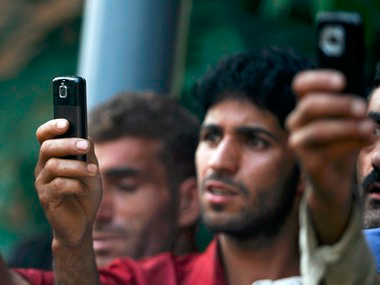Location Tracking: Why the Govt-Mobile Manufacturer War Won’t End Soon
The article by Danish Raza was published in FirstPost on October 15, 2013. Sunil Abraham is quoted.
In the aftermath of Nirbhaya gangrape case in December, Delhi Police approached mobile operators to implement LBS, but the operators refused citing the costs involved in the process, said M M Oberoi, joint commissioner of Delhi police. Oberoi was talking at the India Conference on Cyber Security and Cyber Governance, conducted by FICCI in New Delhi on Tuesday. “Often the person in distress dials 100 but does not know his or her location. Therefore, it becomes difficult for the PCR vans to track the victim. A lot of time is spent trying to figure out the victim’s location, as it happened in the 16 December gangrape case,” said Oberoi.
 |
|---|
|
Representational image. Agencies.
|
As reported by Firstpost, the government has already directed all telecom service providers to make location details a mandatory part of call data records (CDR) of all mobile users in the country starting mid- 2014.
India is the second-largest mobile phone user with over 900 million users, as per the union government data. However, mobile companies are not complying with the government order, Oberoi told Firstpost. “In our attempt to develop a better response mechanism, we are also exploring ways through which we can bypass mobile companies to track the person. We can do it through software,” he added.
The mobile companies have maintained that they can help the government in tracking people in distress, but the kind of accuracy the law enforcement forces are demanding involves huge costs.
The DoT directive says that while detecting the location of the mobile users in urban centres, the telecom operator should achieve 80 percent accuracy in the first year of implementing the technology followed by 95 percent accuracy in the second year. However, it is not clear from the DoT note which year will be taken into account while determining the degree of accuracy of the company’s technology – 2011 (when the order was issued) or 2014 (when location details shall be part of CDR for all mobile calls).
“For such accuracy, we need to put enhanced cell tracking software on cell towers which is a very expensive process,” Rajan S Mathews, director, Cellular Operators Associations of India, told Firstpost.
In the last meeting with the representatives of DoT, Cellular Operators Associations of India told the former that it was against the idea of LBS for all mobile users, but can cooperate in the case of targeted tracking, said Mathews.
He suggested two alternatives which can work to track a person in distress. It should be mandated by the government, he said, that people use only high end phones which send signals to cell towers when they make a call. “It is not easy to make everyone use such devices though.”
Another possibility, according to him, is that a person gets registered with the mobile operator for such service. “When this person is in distress and dials 100, he avails the service through which police can track his or her location,” said Mathews.
According to Sunil Abraham, director of Bangalore based Centre for Internet & Society, it is unethical implement LBS as a blanket order and the government, along with mobile operators, should find a way out to introduce targeted surveillance.
“There is an initial increase in security that accompanies increase in surveillance – after which increased surveillance actually undermines the security imperative and could make the security worse than when surveillance was initiated. Therefore surveillance should always be targeted, blanket surveillance is almost always a terrible idea,” he said.




